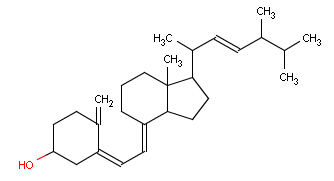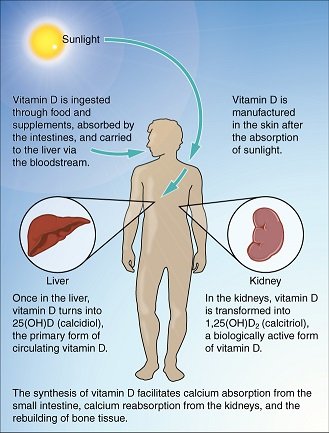I am critical of vitamin supplements. We usually get enough vitamins from our diet. Also there seem to be health impairments associated with too high dosages of vitamins in our bodies. That being said, vitamins are essential to the functions of our lives. Today I want to start a new series, and I will try to post in this once a week (every Wednesday). It is cheesy but I will call this "Vitamin Wednesday". In this series I want to highlight the benefits of certain vitamins. Let´s get started.
Vitamin D - What Is That?

Vitamin D is a derivative of steroid, is fat soluble and a non-essential "Vitamin" (1). Technically speaking, Vitamin D more closely resembles a hormone than a vitamin - it has a similar structure to steroid hormones and Vitamin D receptors are known to regulate cell differentiation, cell proliferation, and calcium homeostasis (2). Studies have shown that exposure of arms and legs to UV radiation for 5-30 minutes between 10am and 3pm twice a week is enough for us to synthesize sufficient levels of vitamin D (3). This seems to be easily achievable. However, even in areas of the world where the UV radiation is good enough, many people fail to get enough exposure to UV radiation to synthesize enough vitamin D (4). Dietary vitamin D uptake is most efficiently done by consuming fish oils, as many other nutritional sources do not contain enough vitamin D - some governments even have laws that require "fortification" of foods with vitamin D (4). So vitamin D is necessary for us to lead a healthy life. But why do we need vitamin D?
Functions Of Vitamin D
There are many potential functions of vitamin D. The most extensively studied function is in calcium metabolism. Probably all of us have been exposed to some sort of advertisement that we need to drink milk and eat yoghurt to build up healthy bones. I felt very smart knowing that we also needed sunlight for healthy bones. Take those and combine them and we have a theory that has some backing by science.
Vitamin D and calcium are needed to make healthy bones (5). A recent study states that vitamin D's primary role in bone homeostasis is to stimulate intestinal calcium absorption to ensure that calcium ions are readily available (6). The same study also suggests that vitamin D is involved in making sure that serum calcium levels are sufficient, even if that means that bone tissue is demineralized (6). This shows that vitamin D is regulating calcium serum levels rather than ensuring sufficient bone density. A possible implication is that it is necessary to consume sufficient amounts of calcium to ensure bone health.
By regulating calcium levels in the body, vitamin D indirectly affects many processes in the body. Among the functions of calcium in the human body are skeletal mineralization, muscle contraction, nerve impulse transmission, blood clotting, and hormone secretion (7).
Oftentimes the importance of a particular bioactive molecule is observed when it is somehow impaired. A study has shown that low vitamin D levels in pregnant women may lead to an increased risk of obesity in the child (8). There also seems to be an immunological effect of vitamin D, as a study has shown an improved symptoms/medication score in children with grass pollen allergy when given a vitamin D supplement (9). The researchers sadly did not suggest possible modes of action. Another study suggests a possible link between urinary tract infections in children and vitamin D deficiency (10). Vitamin D deficiency, in addition to raised levels of HbA1C, may be a new signal in the early diagnosis of diabetes mellitus (11). It also seems that vitamin D may offer some protection against the development of colon and other cancers, as well as in cancer treatment (12). Its effect as an anti-cancer agent is largely attributed to its ability to inhibit cell proliferation in cancer cells, as well as to activate apoptosis (programmed cell death) and inhibition of angiogenesis (formation of new blood vessels in and around tumors) (13). It is noteworthy that vitamin B's cancer-preventive capabilities are specific for certain kinds of cancer. A study was not able to show a good correlation between vitamin D and prevention of esophageal cancer (14).
Summarizing the above, vitamin D has many possible health benefits, some of which we do not even know or understand. Thus it is vital to ensure sufficient vitamin D levels through dietary intake and by ensuring sufficient exposure to sunlight.

Source
My Opinion
This sounds very promising. However, vitamin D is not a wonder weapon against every disease. Vitamin D intake through diet is associated with fish oils. Fish contains many beneficial nutrients such as healthy unsaturated fatty acids that our body cannot synthesize. Vitamin D requirements can also be fulfilled by being in the sun for short periods of time every day. When people are outside, they tend to be active. So, personally I think that the health benefits of vitamin D are not just due vitamin D but a lot of co-factors. I would refrain from vitamin supplements, unless you are medically required to take them. Otherwise, you have no excuse to have insufficient vitamin D levels because everybody can manage to get out into the sun for 10 minutes every day. Furthermore it is potentially dangerous to fall for fitness and health fads. People love to overdo it. Reading X may prevent Y without fully understanding the underlying mechanisms often causes a run for some magic alternative to medicine. There is no wondercure. Everything in our body has an optimum level, that is the whole point of homeostasis. Additionally, most of us are healthy. Sometimes it is bad to fix a problem that is not there. Prevention of disease can be done by not eating too much, and leading an active lifestyle (that does not mean that you have to work out 24/7). Just go outside and enjoy nature, and produce some vitamin D - no supplement needed.
Shameless Self-Advertisement
If you enjoyed this post, please upvote and share. If you have comments, suggestions or just want to praise my work - use the comments section (please no "good post, please follow" spam).
I am trying to provide quality contents by researching relevant topics in science. If that sounds interesting to you, please feel free to check out my blog. I try to post once a day and I put a lot of effort into my posts.
Thank you again for reading!
As always,
Cheers @lesshorrible!


Thank you for this excellent summary. I am looking forward for the next "Vitamin Wednesday" ;-)
Electrocyclic reaction!!! XDD
Thats why you need sun shine :DD
Diese Tipp ist zwar gut, aber das Problem dabei ist, das dies in unseren Breitengraden nicht immer funktioniert:
Quelle: Ärztezeitung
Das ist auch einer der Gründe warum viele Menschen, die viel im Freien Arbeiten (z.B. Bauern) des öfteren im Winter niedrige Vitamin-D-Werte haben. Ob dann eine Zugabe von Nahrungsergänzungsmitteln notwendig ist, ist eine andere Frage. Ist es nicht zu kritisch kann es helfen z.B. fetten Fisch oder Eier zu essen.
Ja ich stimme zu! Ich habe aber auch irgendwo mal gelesen dass man im Winter eben ein wenig länger raus muss. Die Aussage war hauptsächlich für Menschen die immer irgendwelche Ausreden suchen.
Es gibt Studien in Finnland in denen gezeigt wurde das Nahrungszusätze (z.B. vitamin D in Milch und Butter) helfen die Vitamin D Level zu verbessern. Allerdings ist Finnland weiter nördlich und deren Winter sind wirklich dunkel. Wenn immer sich Aussagen finden die sich wiedersprechen braucht es mehr Forschung. Glücklicherweise sollte ein aktiver Lebenstil und eine vielfältige Ernährung ausreichen. Für die meisten Menschen sollte es genügen Zeit im Freien zu verbringen und fettige Fische und Calcium-haltige Joghurts zu essen.
Vielen Dank für das Kommentar! Und vielen Dank dafür dass du meinen Post wirklich gelesen hast @vladimir-simovic. Cheers!
Great post! I must admit you are good at describing the vitamin D.
I agree with you, we can restore adequate amount of vitamin D by basking in the sunlight.
OK.. This is quite informative. Maybe I'll never get to joke with the morning sun again. Thanks @lesshorrible
I have been doing some research on thyroid illnesses and I found that Vitamin D has a lot to do with- especially in autoimmune conditions!
Yeah, there seem to be many more effects that vitamin D has on our health that we don´t even know yet. There is a need for more research to understand the modes of action better. Luckily there are biochemists! Cheers!
I really enjoyed the fact how informative of your post is, but I disagree with one thing about it. Vitamin D supplementation may be needed even for the "average" person, especially during winter time in Northern countries. At this time of the year it's practically impossible to get adequately sunlight for vitamin D synthesis, since sunlight isn't a self-evidence. Therefore many people suffer from vitamin D deficiency in winter. So, supplements aren't always that bad but rather beneficial. :)
Yes you are right @jasmink. There are certain regions on this planet where the UV radiation may not be sufficient and then supplements may make sense (like Finland). However, there are some dietary sources and I do think it is better to fulfill your needs with natural sources first if possible. Also a lot of countries "fortify" butter and milk with vitamin D to ensure adequate vitamin D levels. Thank you for your elaborate post! Cheers!
Good post. So informative
Thanks for your information.
waw much benifits of vitamin D, thank you
Vitamin D is an excellent vitamin.
Misnamed I would argue as it acts more like a hormone.
However, I have read that supplementing can "confuse" the body, as normally we would get the Vit D from the sun.
Sun exposure has many more other benefits.
So, best case, get SAFE sun exposure when possible. Supplement in the winter.
Thank you for covering vitamin D. I think it’s important for people to understand vitamins and their part in the human body, vitamin deficiencies and contraindications.